AAC Awareness Month 2016
AAC Awareness Month 2016
Theme: AACcess All Areas
- From Canada
Submitted by Shelley Deegan
To celebrate AAC Awareness Month 2016, the Technology Access Clinic at Hamilton Health Sciences in Hamilton Ontario, Canada showed the films from the Film Festival at ISAAC 2016. We invited people from across the hospital. One good outcome was that a student in Recreation Therapy at a local college came to see the films during our event. He shared the link with his professor and now the films will be used to spread AAC awareness with the college Recreational Therapy Program.nnnnnn
- From Egypt
Submitted by Yvette Abdel Malek
Yvette Abdel Malek presented a lecture on Sunday, October 16th for 50 participants in the speech diploma program at Ein Shams University. People came together from different parts of the country to attend the lecture. She also hosted a workshop using speech and AAC material. Hayat Academy donated materials to support the work of her secondary school students who are creating AAC albums.
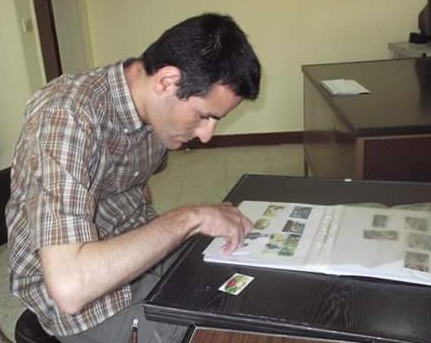
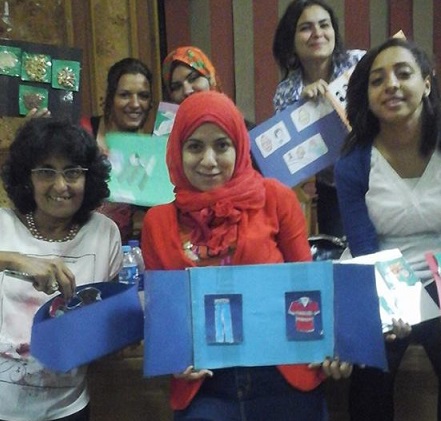
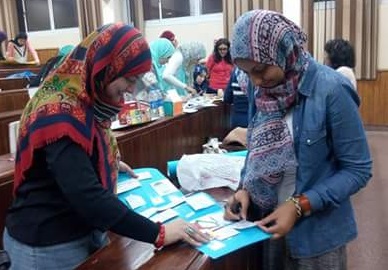
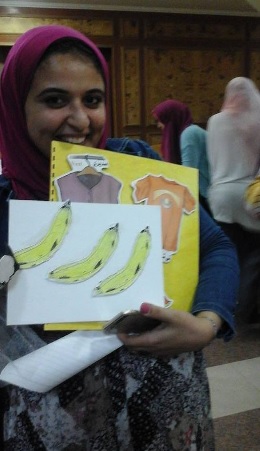 nnnnnnnnnnn
nnnnnnnnnnn
- From India
Submitted by Jeeja Ghosh
The month of October is a time for celebration – a celebration of abilities. We celebrated World Cerebral Palsy Day and AAC week together this month. The Indian Institute of Cerebral Palsy (IICP) observed World Cerebral Palsy Day on October 5, 2016.
The morning program began with an awareness program on cerebral palsy. This program was jointly organized by the Office of the Disability Commissioner for Persons with Disabilities – the state apex body responsible for disability affairs. The highlight of the program was sharing information regarding cerebral palsy from the perspectives of a medical professional and physiotherapist. The program was concluded by a cultural performance by the students and trainees of IICP. This performance and a vote of thanks, in the form of a poem, was scripted by Barsha Bhattacharya, a person who uses AAC.

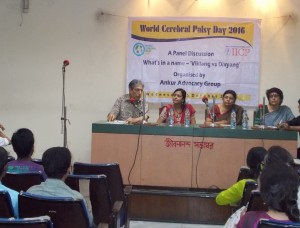
In the afternoon a panel discussion on “What’s in a name: divyang vs viklang,” discussed the government’s proposition to change the Hindi term for persons with disabilities – viklang (incapable or incapacitated) to divyang (divine or god like). The panelists included Rantaboli Ray (Mental health activist, moderator), Prof. Surendra Munshi, (Retired Professor Sociology, IIM, Kolkata) Dr. Jhuma Basak (Psychoanalyst & Associate Professor, NSHM, Institute of Media & Design) Mamata Dev (Parent & special educator), Esha (Activist, art and culture) Dipak Ghosh (Disability rights activists & advocacy trainer, IICP). All the speakers in the panel were not in favour of the change in the nomenclature. Dipak, an AAC user, objected to being addressed as an ‘extraordinary divyang’. He stated that while names are necessary for identification, the Government should adhere to the dictates of the UNCRPD to create opportunities for persons with disability, rather than focusing on names. Since many English terms are used officially, he strongly recommended the use of the phrase Persons with Disability.
nnnnnn
- From ISAAC-Australia
International AAC Awareness activities, including the National AAC Picnic on October 8th, are featured on ISAAC-Australia’s blog.
nnnnnnnnn
- From ISAAC-India
Great enthusiasm was seen among members of Isaac India chapter in celebrating AAC awareness month. Organizations across India conducted different events creating awareness about AAC.
North India, represented by AADI, had as a part of AAC awareness program collated and displayed the various Communication aids being developed and used in India. A presentation by Mr Arun Mehta, a computer engineer, who developed a number of communication software and hardware was well received by participants from different NGOs and inclusive schools, parents.Also a group of professionals interested in AAC has been formed to meet once a month to share and discuss needs, information, thoughts and ideas. A weekend training course for working speech therapists and special educators on AAC is also planned starting in November for 6 weekends.
South India has two representations, Vidya Sagar, Chennai, an NGO working with children and adults with disabilities and by National Institute of Speech and Hearing (NISH), Kerala.
Vidya Sagar had chalked out a number of programmes as a part of AAC awareness month. As the theme was Access to AAC in all places, three public places were identified and in collaboration with the concerned authorities these places were made AAC accessible. The famous Birla Planetarium, Anna library and shopping mall were selected and AAC users along with the staff approached the institution heads. An awareness program was held and all the signage on the premises was made accessible.
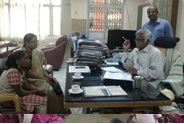 Discussion with Director of Birla Planetarium
Discussion with Director of Birla Planetarium
Vidya Sagar also conducted interactive workshops for the parents of AAC users below the age of 10 years and displayed all the devices and communication software’s. The importance of early communication skills, language development was stressed upon.
AAC awareness workshops was held in an inclusive school and in an NGO in rural Tamil Nadu. The students from inclusive school were taught sign language and also the importance of communication was implied through sensitization activities. Children with speech difficulties were assessed in a screening camp in the village. AAC was prescribed and the community workers, parents were given a training on implementation of AAC.
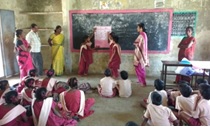 Workshop at an inclusive school in rural India
Workshop at an inclusive school in rural India
National Institute of Speech and Hearing (NISH), an autonomous body under the Department of Social Justice, Government of Kerala, India focusing on the identification, rehabilitation, education of the individuals with communication disorders celebrated AAC week with first of its kind and aimed at developing awareness among Graduate and Undergraduate students of Speech Language Pathology and faculties from other departments in the institute (such as Dept. of Early Intervention for children with hearing impairment, Dept. of Allied Health Sciences, Dept. of Neurodevelopmental Sciences and Dept. of Degree HI). The program was presided over by Dr. Samuel Mathew; Executive Director, NISH and Dr. Satheesh Kumar, Director, Centre for Assistive Technology and Innovation (CATI), NISH. This was followed by a short presentation on AAC by the Intervention team members. The program ended with an exhibition put up by students of Speech Language Pathology on the theme “No tech Communication systems”.
nnnn
- From ISAAC-Norway
Submitted by Hanne Pauline Jensen
Events planned for October in Norway to raise awareness and celebrate AAC include:
– AAC Basic Course Trøndelag 20.10,16 by Statped midt, fagavdeling sammensatte lærevansker og ervervet hjerneskade/Department of Complex Learning Difficulties and Acquired Brain Injury
– AAC Basic Course 18.10.16, by Statped sørøst, fagavdeling ervervet hjerneskade/Department of Acquired Brain Injury
– AAC Network Meeting, Bodø, North Norway 26.- 27. 10, professionals in Hospital, Habilitation
– AAC Meeting for parents and dependents to people who needs AAC, 4.-5. november in Oslo (ISAAC)
nnnnn
- From ISAAC-Taiwan
Submitted by Meng-Ju Tsai
Dr. Meng-Ju Tsai and his undergraduate students from the Department of Speech Language Pathology and Audiology in Chung Shan Medical University will have an AAC internship to develop low-tech AAC devices for each child served through Taiwan Fund Children and Families in the 2016 fall semester. On September 30, 2016, they attended the internship orientation.
nnn
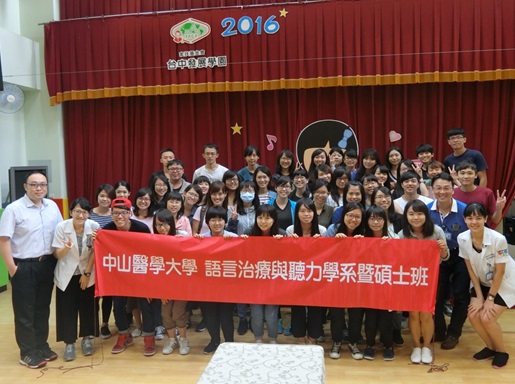
nnnnnnn
- From ISAAC-UK: Communication Matters
This year, Communication Matters is promoting a new event, “Communication Matters Cupcakes & Natter” in schools, clinics and homes during International AAC Awareness Month. Please see the PDFs below for more information and a cupcake recipe to get you started!
– CM Cupcake & Natter flyer (PDF, 239 kB)
– CM Cupcake & Natter recipe (PDF, 260 kB)
nnnnnnnnn
- From ISAAC-US: United States Society for Augmentative and Alternative Communication
Submitted by Amanda Hettenhausen
Join the Conversation: #USSAAChat … In the spirit of AAC Awareness Month, USSAAC kicked off its first ever Twitter Chat! A Twitter Chat is a live conversation, held on Twitter around a shared topic. Through the use of a unique hashtag (#USSAAChat), the conversation is kept together, allowing others to follow along and participate. The goal of our chat is to strengthen the AAC community by creating regular discussion among people who use AAC, their families, and those who work with them. Each chat has a moderator, who selects a topic and proposes 5-6 questions throughout the hour-long chat.
The first chat, held in October 2016, was moderated by AT Specialist and Podcast host Chris Bugaj @attipscast. The topic, “Increasing Cultural Awareness of #AAC,” encouraged over 100 tweets among the 20 people participating.
Interested in participating in the Twitter Chat? Simply search Twitter for #USSAAChat at 7pm EST, the 2nd Thursday of every month. The moderator will usually begin with introductions, and then ask the first question, “Q1.” If you want to share something, type “A1” to correspond to the question “Q1.” Type your comment, and end the post with #USSAAChat. This is very important, because it is the only way to keep the post within the conversation.
It might be nice to try “lurking” the first few times, and read through others’ posts, liking or retweeting any comments of interest. You might also want to use a tool like Tweetdeck to make it a little easier to follow. The questions to the TwitterChat will be posted in advance on the USSAAC website. This would allow you time to compose your answers, since the chat tends to move quickly. Following the chat, a a transcript will also be available at ussaac.org.
USSAAC has already been honoured to have Chris Bugaj, Amanda Soper and Lauren Lamore, and Jeff Stepen as #USSAAChat moderators in 2016. We are looking forward to the conversations in store for 2017!
Ready to join the conversation?
The next Twitter Chat is 2/9/17 at 7pm EST.
Join Carole Zangari (@prAACticalAAC.org) as we discuss “Increasing Awareness: Building a Culture of AAC Support
Amanda Hettenhausen, MAR, CCC-SLP, USSAAC Director of Public Information amanda@saltillo.com
nnnnn
- From Italy
To celebrate the AAC Awareness Month, Centro Benedetta D’Intino Onlus in Milan, Italy, held a two-day conference on Communication Access and Human Rights. During the first day, professionals from different fields, politics, culture, justice, and disabilities associations discussed barriers that limit access to human rights and self-determination, focusing on accessibility and inclusion for individuals with complex communication needs. On the second day, Barbara Collier, Executive Director of the Communication Disabilities Access (CDAC – Canada) presented CDAC’s project focusing on and proposing the CDAC “Guidelines for police, legal and justice services” and how to overcome communication barriers by creating efficient communication accessible services.
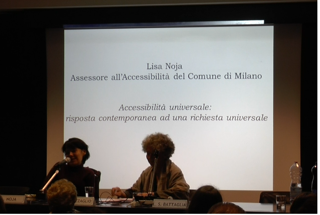
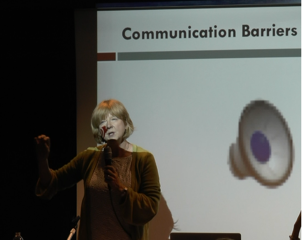
Submitted by the staff of CBD’I onlus, Milan, Italy
nnnn
- From Qatar
Submitted by Mrs. E.A. Draffan
The Tawasol symbols team from Qatar ran a workshop in Doha on October 10th for parents, therapists and people with autism on the importance of using culturally and linguistically appropriate symbols. Demonstrations were given on how to use Tawasol symbols to support communication and build vocabulary in a fun and exciting way through Tawasol game cards. The team provided free Arabic symbol resources to the audience in Arabic and English http://tawasolsymbols.org/en/resourcedownloads/resource-downloads/. The attendees were very excited to see and receive something that they believe represented their culture and religion and were very keen to start using the Tawasol resources.
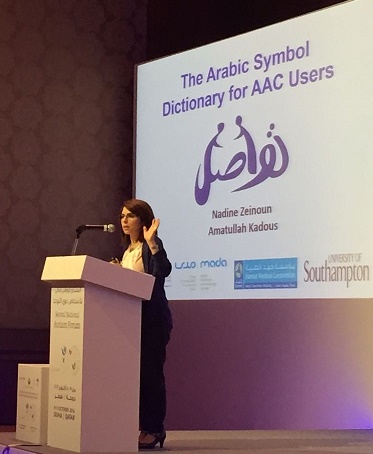
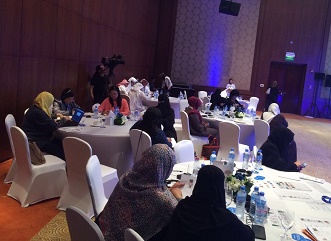
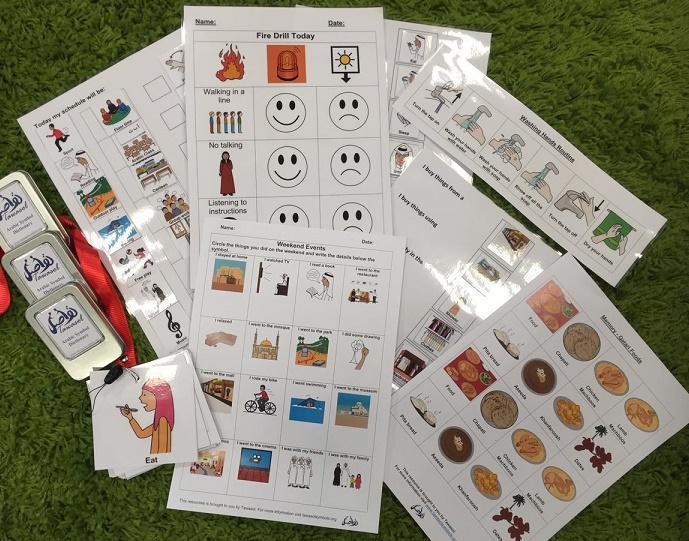
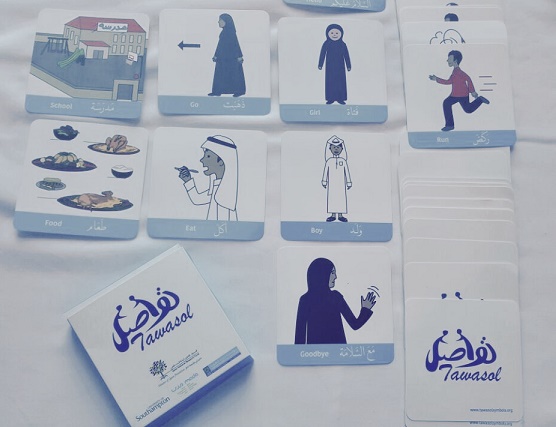
nnnnnnn
- From Singapore
Submitted by Sarah Yong
The following activities are happening in Singapore during October:
– Party Time!! Specialised Assistive Technology Centre at Tech Able will organize a party for its children who use AAC. Children who use various different systems will have the opportunity to communicate and have fun. Activities include food (fries and nuggets), balloon sculpting and a photo booth.
– Tour Guide Tales. This short video presentation follows Yong Seng Koon, a young man who uses a high-tech communication device as he prepares for and conducts his first AAC tour at Tech Able for a group of children of staff of the Ministry of Social and Family development.
– AAC: building connections, impacting lives, opening doors. Singapore’s Tech Able and SPD websites and Facebook pages will feature a series of informational articles about how AAC impacts lives.
nnnnnnn
- From South Africa
Submitted by Constance Ntuli
On October 15th, TEDx Cape Town in South Africa hosted its annual event with the theme being, Hear to Listen. Robyn White from the Centre for Alternative and Augmentative Communication (CAAC) was one of the speakers. Her talk, titled “Giving a voice to the voiceless”, was about how AAC can help end the silence for those who have no voice, who are not literate, and who have been victims of crime by identifying context specific vocabulary (for example, testifying in court) and using graphic symbols. The talk will be edited and shared on November 21st. Also, an interview with Dr. Kerstin Tönsing (in Afrikaans) is available on the CAAC website here.
The official day for AAC Awareness in South Africa was October 27th.
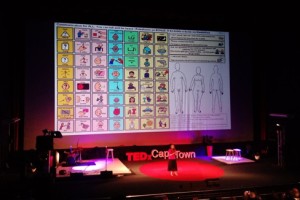
Constance Ntuli, disability advocate, mentor and office administrator at CAAC, approached the media as well as local schools inviting them to have her share her personal experiences and knowledge about AAC. Here she is doing a radio interview to raise awareness of AAC.
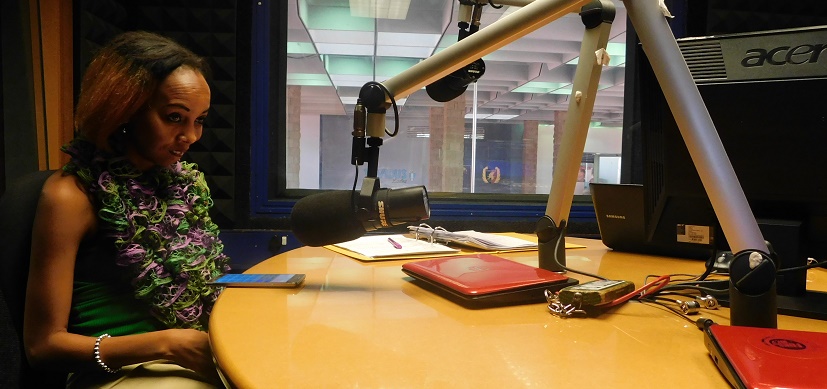
Listen to the interview here.
nnnnnnn
- From USA
Thanks to Judy Bailey for event updates
The 8th Annual 24 Hr International AAC Chat / Readathon was held on Facebook, October 14th – 15th. This took place in two parts with a three-hour break:
– The 4-Hour Startup Chat to launch the event: 1:00-5:00 p.m. (EDT) on Friday, October 14th (followed by a 3-hour break), then
– The 24-Hour Chat: 8:00 p.m. Friday, October 14 through 8:00 p.m. (EDT) Saturday, October 15th. The chat was extended when participants expressed interest in continuing. #AACChat
nnnnnnn
Submitted by Patricia Gillule
Candor High School in Candor, New York, celebrated International AAC Awareness Month on the last Friday in October. Students who use AAC hosted an event to enable students in grades 7-12 to communicate in alternative ways. They also made pins with slogans on them that were designed by the school’s AAC users. Students and staff across the building wore the pins in support of AAC and all who deserve to be heard.
 |